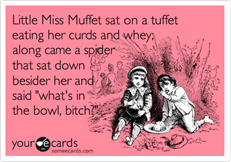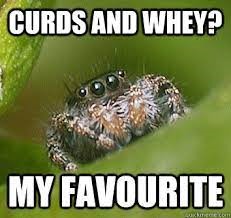Did someone ask you if you know what 'curds and whey' are and if you can use them as a protein supplement in the gym? This post unpacks the meaning and origin of this expression.
Meaning
The expression 'curds and whey' refer to the byproducts of the cheese manufacturing process. Cheesemakers add the enzyme 'rennet' to milk, causing it to curdle. The lumps that form in the mass are called 'curds.' The 'whey' is the liquified byproduct created by the curdling process.
Today, very few people eat curds and whey. Cottage cheese is similar to curds and whey, but it undergoes a process involving washing and salting before being drained. As a result, cottage cheese contains far less whey than the traditional 'curds and whey,' used as food some 400 years ago.
The most common use of 'curds and whey' is in the children's nursery rhyme, 'Little Mis Muffet.'
Example Usage
"We create curds and whey by allowing the enzymes in the pouch lining to mingle with the intense heat of the process, resulting in separation of milk into curds and whey."
"When a cheesemaker turns the milk to curds and whey, the curd differs. It depends on the type of cheese manufactured on the day."
"Curds and whey are disgusting. Have you seen it before? It looks like a solid mass floating in yellow liquid and smells like sour milk. Disgusting."
"They said Little Mis Muffet sat on her tuffet, eating her curds and whey. Have you tasted curds, and why? It's terrible, and I have no idea why anyone would eat that stuff."
"I taught my kids the Little Mis Muffet sat on her tuffet, eating her curds and whey nursery rhyme today. They all thought it was hilarious."
"Have you heard Andrew Dice Clay's version of 'Little Miss Muffet sat on her tuffet, eating her curds and whey'? It's savage. That guy is so funny."
"If you don't behave, I'll make curds and whey for dinner. How does that sound? Yeah, I thought you'd be quiet."
"I don't care if someone put a gun to my head. I would never eat curds and whey. It's disgusting."
"Curds and whey are the byproducts of the cheese manufacturing process and not something I enjoy eating at all. I don't like drinking sour milk either."


Origin
The expression 'curds and why' originates from the dairy industry. Curds and whey are the byproducts of milk and cheese production, resulting in the food. The phrase is popular due to its use in the classic nursery rhyme 'Little Mis Muffet.'
Language experts believe the nursery rhyme was used for centuries before its first publishing in the 'Songs for the Nursery' collection in 1805. Dr. Thomas Muffet was a notorious entomologist and physician in the 16th century, with his work only being published centuries after his death.
'Little Miss Muffet' is a popular nursery rhyme and is still used today.
Phrases Similar to Curds and Whey
- N/A.
Phrases Opposite to Curds and Whey
- N/A.
What is the Correct Saying?
- Curds and whey.
Ways People May Say Curds and Whey Incorrectly
The phrase ‘curds and whey’ doesn’t have any use outside the traditional nursery rhyme or the dairy industry. Today, curds and whey is not a popular foodstuff in the western world, being replaced by other foods.
Acceptable Ways to Phrase Curds and Whey
You can use the phrase ‘curds and whey’ when discussing the nursery rhyme ‘Little Mis Muffet.’ Curds and whey are the byproducts of dairy production. There isn’t much use for the saying outside of the nursery rhyme, as other food items like cottage cheese, similar to curds and whey, replaced this traditional food many decades ago.
Bodybuilders and athletes will use ‘whey’ protein to help them recover from the training effect. However, this is usually ‘whey isolate’ or ‘hydrolyzed whey,’ not the traditional foodstuff mentioned in the original nursery rhyme.